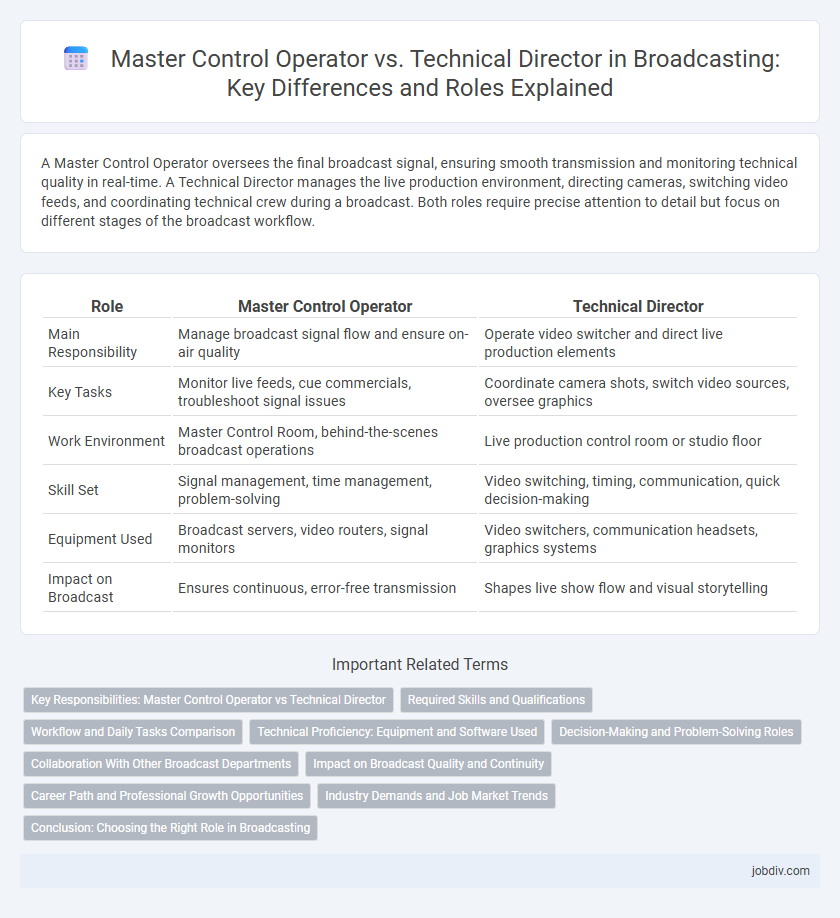A Master Control Operator oversees the final broadcast signal, ensuring smooth transmission and monitoring technical quality in real-time. A Technical Director manages the live production environment, directing cameras, switching video feeds, and coordinating technical crew during a broadcast. Both roles require precise attention to detail but focus on different stages of the broadcast workflow.
Table of Comparison
| Role | Master Control Operator | Technical Director |
|---|---|---|
| Main Responsibility | Manage broadcast signal flow and ensure on-air quality | Operate video switcher and direct live production elements |
| Key Tasks | Monitor live feeds, cue commercials, troubleshoot signal issues | Coordinate camera shots, switch video sources, oversee graphics |
| Work Environment | Master Control Room, behind-the-scenes broadcast operations | Live production control room or studio floor |
| Skill Set | Signal management, time management, problem-solving | Video switching, timing, communication, quick decision-making |
| Equipment Used | Broadcast servers, video routers, signal monitors | Video switchers, communication headsets, graphics systems |
| Impact on Broadcast | Ensures continuous, error-free transmission | Shapes live show flow and visual storytelling |
Key Responsibilities: Master Control Operator vs Technical Director
Master Control Operators manage broadcast signal flow by monitoring audio and video feeds, ensuring seamless transmission, and troubleshooting equipment issues to maintain broadcast quality. Technical Directors oversee the technical aspects of live production, including directing camera operations, managing video switchers, and coordinating with production teams to execute real-time content control. Both roles require expertise in broadcast equipment, but Master Control Operators focus on signal integrity while Technical Directors concentrate on live event execution.
Required Skills and Qualifications
Master Control Operators require strong attention to detail, proficiency in broadcast automation systems, and the ability to monitor live feeds to ensure seamless transmission. Technical Directors must possess advanced technical knowledge of video switchers, audio mixers, and live production workflows along with leadership skills to coordinate production teams effectively. Both roles demand excellent problem-solving abilities, familiarity with FCC regulations, and experience in high-pressure broadcast environments.
Workflow and Daily Tasks Comparison
Master Control Operators monitor broadcast signals, ensuring seamless transmission and compliance with regulations by managing playback servers, switchers, and communication with on-air staff. Technical Directors operate live production equipment during broadcasts, controlling video switchers, graphics, and camera feeds to execute the director's vision in real-time. While Master Control Operators focus on signal integrity and scheduling, Technical Directors concentrate on live content execution and switcher operations within the production control room.
Technical Proficiency: Equipment and Software Used
Technical Directors in broadcasting operate advanced video switchers, audio mixers, and signal processing equipment, ensuring seamless live production quality through precise control of lighting, camera feeds, and graphics. Master Control Operators specialize in broadcast automation systems, signal routing, and transmission monitoring, maintaining uninterrupted delivery and adherence to regulatory standards. Both roles require proficiency with industry-standard software such as automation platforms, media servers, and real-time monitoring tools to manage complex broadcast workflows efficiently.
Decision-Making and Problem-Solving Roles
Master Control Operators ensure smooth broadcast operations through real-time monitoring and quick decision-making to address signal issues, transmission errors, or equipment failures. Technical Directors oversee the technical execution of live productions, solving complex problems related to video switching, camera feeds, and audio integration to maintain broadcast quality. Both roles require critical problem-solving skills, with Master Control Operators focusing on operational continuity and Technical Directors emphasizing creative and technical coordination.
Collaboration With Other Broadcast Departments
Master Control Operators collaborate closely with Technical Directors to ensure seamless broadcast transmission by coordinating signal flow and maintaining equipment functionality. Technical Directors rely on Master Control Operators to manage real-time technical adjustments during live productions, facilitating smooth interactions with graphics, audio, and camera crews. Effective communication between these roles enhances synchronization between content delivery and technical execution across broadcast departments.
Impact on Broadcast Quality and Continuity
Master Control Operators ensure broadcast quality and continuity by monitoring signal integrity, managing playback devices, and troubleshooting technical issues in real-time, which minimizes on-air disruptions. Technical Directors coordinate live production elements such as camera switching, graphics, and audio mixing to create seamless visual storytelling, directly impacting the viewer's experience and broadcast professionalism. Both roles are critical for maintaining uninterrupted transmission and elevating overall broadcast standards.
Career Path and Professional Growth Opportunities
Master Control Operators and Technical Directors offer distinct career paths within broadcasting; Master Control Operators typically focus on monitoring and managing broadcast signals, advancing into senior control room roles or technical supervision. Technical Directors oversee live production elements, with growth potential leading to roles in production management or broadcast engineering leadership. Both positions provide foundational skills for expanded technical expertise and leadership opportunities in the broadcast industry.
Industry Demands and Job Market Trends
Master Control Operators ensure seamless broadcast signal transmission by monitoring equipment and managing live feeds, catering to the industry's growing demand for reliable content delivery. Technical Directors lead the technical team during live productions, operating advanced broadcast technology to meet the increasing complexity of multi-camera setups and live event streaming. Job market trends show rising demand for Technical Directors with expertise in digital platforms, while Master Control Operators maintain steady opportunities due to critical operational roles in traditional and emerging broadcast environments.
Conclusion: Choosing the Right Role in Broadcasting
Selecting the right role in broadcasting depends on one's technical expertise and career goals; Master Control Operators specialize in monitoring broadcast feeds and ensuring signal quality, while Technical Directors focus on managing live production equipment and coordinating visual elements during broadcasts. Understanding the distinct responsibilities of each position helps professionals align their skills with industry demands, optimizing workflow efficiency and broadcast quality. Career growth in broadcasting is enhanced by choosing a path that matches both personal strengths and the evolving technical landscape of the media industry.
Master Control Operator vs Technical Director Infographic

 jobdiv.com
jobdiv.com